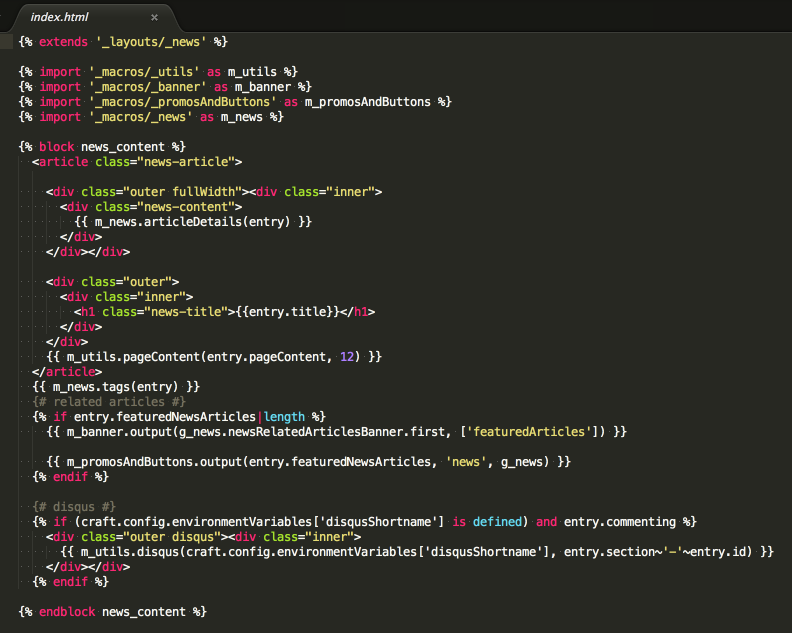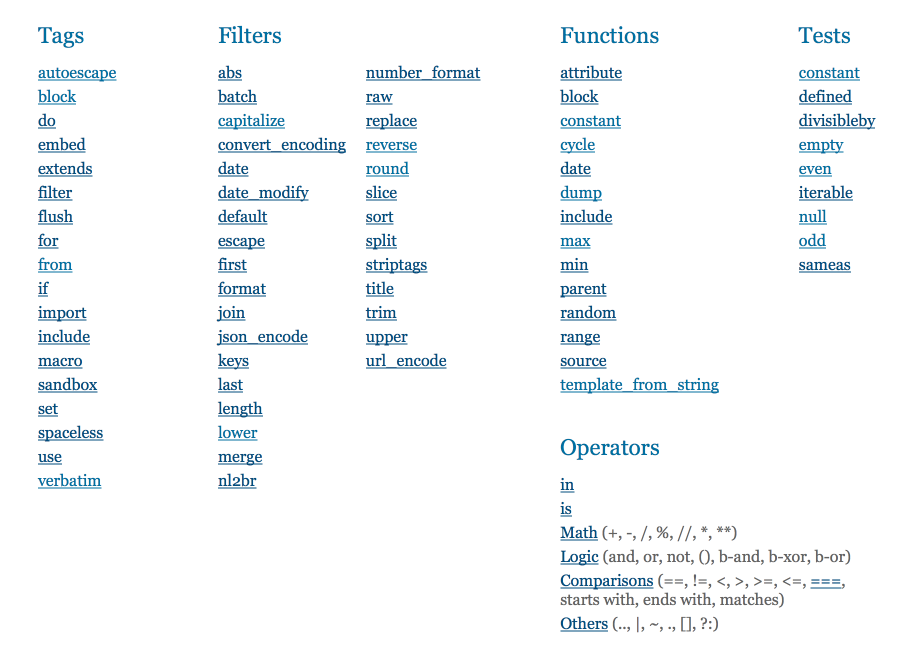Programming in Twig

Twig syntax
{# comments #}
{{ output }}
{% tags %}
Twig Values
-
strings:
'single quotes'"double quotes"~is the string concatination operator:'foo'~'bar' => 'foobar' -
numbers:
1, 2.5, -7 -
booleans:
trueandfalse -
arrays:
['foo', 23, []] -
associative arrays:
{key: 'value', anotherKey: [1, 2, 'frogs']} - and really, any php value
Operators
- The usual (
+, -, and, or, not, ==, <, >,etc.) plus filters and functions. -
filters example:
-
['a', 'b']|join(', ')
=>'a, b' -
['a', 'b']|join(', ')|upper
=>'A, B'
-
-
functions example:
max(foo, bar, 0)
Who defines these things?
- twig core
- craft
- plugins
Twig documentation

Craft Filters, functions and tags
Filters: currency, datetime, filesize, filter, group, indexOf, intersect, lcfirst, markdown (md), number, parseRefs, percentage, replace, translate (t), ucfirst, ucwords, without
Functions: ceil, floor, getCsrfInput, getFootHtml, getHeadHtml, shuffle, url
Tags: cache, exit, header, includeCss, includeCssFile, includeHiResCss, includeJs, includeJsFile, nav, paginate, redirect, requireLogin, requirePermission, switch
Control Structures
- output
- assignment
- conditionals
- looping/iterating
- functions (macros)
- includes
- extends and embeds
Output
{{ value }}
Convert value to a string
Print that string out inline
{{ 'hello, world'|upper }}
HELLO, WORLD
Output: dump
{{ dump(foo) }}
All the details (var_dump) about foo, printed out.
Need to have devMode enabled for this to work.
{{dump([1, 2, 'fish'])}}
array(3) {
[0]=> int(1)
[1]=> int(2)
[2]=> string(4) "fish"
} Assignment
{% set foo = bar %}
foo will have whatever type bar has
{% set foo %}
...bunch of template code...
{% endset %}
foo will be a string
Conditionals - If
{% if someValue %}
...
{% elseif someOtherValue %}
...
{% else %}
...
{% endif %}
Things that are false: false, 0, '', []
Things that are true: everything else
Conditionals - Switch
{% switch matrixBlock.type %}
{% case 'text' %}
... matrixBlock.type is text ...
{% case 'image' %}
... matrixBlock.type is image ...
{% default %}
... all other cases ...
{% endswitch %}
At most one case block is evaluated.
no fall-through, no break
Iterating: for loops
{% for foo in arrayLikeThing %}
... do something with {{foo}} ...
{% endfor %}
foo is only defined inside the for loop.
array Like Things:
-
any object implementing the
Traversableinterface. (e.g.ElementCriteriaModel) - arrays:
['thingOne', 'thingTwo', 3.14159] - sequences (syntatic sugar for arrays):
'a'..'z' - associative arrays:
{ key: value, key2: value2 }
for loop example
{% for animal in ['cat', 'dog', 'fish'] %}
all about the {{animal}}
{% endfor %}
all about the cat
all about the dog
all about the fish
Iterating over associative arrays
{% set pets = {
cat: 'Puff',
dog: 'Spot'
} %}
{% for animal in pets %}
{{loop.index}}: {{animal}}
{% endfor %}
1: Puff
2: Spot
Iterating over keys
{% for animal in pets|keys %}
{{loop.index0}}: {{animal}}
{% endfor %}
0: cat
1: dog
Iterating over keys and values
{% for key, value in pets %}
{{key}}: {{value}}
{% endfor %}
cat: Puff
dog: Spot
Loop variables
loop.indexandloop.index0loop.firstandloop.lastloop.revindexandloop.revindex0loop.lengthloop.parent
(for example:loop.parent.loop.index)
Functions (macros)
define it:
{% macro foo() %}
...
{% endmacro %}
macros import it:
defined in the same file
{% import _self as self %}
defined in a different file
{% import '_macros/_utils' as m_utils %}
macros - call it:
{{ m_utils.foo() }}
{% set ourFoo = m_utils.foo() %}
Macro richText
{% macro richText(t) %}
{# typogrify filter for smart quotes #}
{{t|smartypants}}
{% endmacro %}
{{ m_utils.richText(entry.body) }}
{{ m_utils.richText() }} {# oops! #}
richText continued
{% macro richText(t) %}
{% if t|default('') %}
{{t|smartypants}}
{% endif %}
{% endmacro %}
What if we want more classes on that div?
{{ m_utils.richText(entry.body,
['this-class', 'that-class']) }}
richText continued
{% macro richText(t, classes=[]) %}
{% if t|default('') %}
{{t|smartypants}}
{% endif %}
{% endmacro %}
Moral: deal with possibly missing parameters.
Recursive Macros
{% macro rNav(pages, depth=0) %}
{% import _self as self %}
<ul>
{% for page in pages|default([]) %}
<li>
{{ page.link }}
{% if page.hasDescendents() %}
{{ self.rNav(page.children, depth+1) }}
{% endif %}
</li>
{% endfor %}
</ul>
{% endmacro %}
recursive macro: calling it
{{ m_utils.rNav(craft.entries.section('sitePages')
.level(1)) }}
Context
In twig, the context is all the values that are currently defined.
{% set foo = 'bar' %}
— adds foo to the context.
_context is a global variable which represents the current context.
{{ dump(_context|keys) }}
array(9) { [0]=> string(5) "craft"
[1]=> string(3) "blx" [2]=> string(3) "now"
[3]=> string(8) "loginUrl"
[4]=> string(9) "logoutUrl"
[5]=> string(8) "siteName" [6]=> string(7) "siteUrl"
[7]=> string(11) "currentUser" [8]=> string(4) "user"
}
Macros and _context
_context is not available in macros, but you can pass it in:
{% set meta = {title: 'myTitle',
description: 'some description'} %}
{{ m_meta.output(_context) }}
Macros and _context (continued)
{% macro output(c) %}
{% import _self as self %}
{% if c.meta is defined %} {# in context? #}
{% set metaData = c.meta %}
{% elseif c.entry is defined %} {# have entry? #}
{% set metaData = {
title: c.entry.mTitle|default(c.entry.title),
description: c.entry.mDescription
} %}
{% else %} {# we got nothing #}
{% set metaData = {title: '', description: ''} %}
{% endif %}
{{self._output(metaData)}}
{% endmacro %}
Macros and _context (continued)
{% macro _output(m) %}
{{m.title ? m.title~' | '}}{{siteName}}
{% if m.description %}
<meta name="description"
content="{{m.description}}"/>
{% endif %}
{% endmacro %}
Includes
{% for matrixBlock in entry.matrixField %}
{% include '_blocks/text' %}
{% endfor %}
The included template has access to the current context. matrixBlock is defined.
We can be more explicit about this:
{% include '_blocks/text'
with {currentBlock: matrixBlock} only %}
currentBlock will be defined... and nothing else
Includes: smart template names
{% for matrixBlock in entry.matrixField %}
{% include '_blocks/'~matrixBlock.type %}
{% endfor %}
Will include the appropriate template for the block type (assuming you have defined it)
{% for matrixBlock in entry.matrixField %}
{% include ['_blocks/'~matrixBlock.type,
'_blocks/_default'] %}
{% endfor %}
Will include the template for the block type if it exists, otherwise _blocks/_default.html
Extends
{# this is 'child.html' #}
{% extends '_layouts/base.html' %}
{% set title = entry.title %}
{% block body %}
{{entry.body}}
{% endblock body %}
Since it extends another template, child.html is not allowed to produce any output. It can add things to the context (e.g. title), and define block contents.
Extends (continued)
{# this is '_layouts/base.html' #}
{{title}}
<body>
{% block body %}hello, world{% endblock body %}
{% block foot %}Copyright 2015{% endblock foot %}
</body>
title will be defined here since it was set in child.html
The body block will be replaced by the body block from child.html
The foot block will be left untouched.
Extends - m_meta again
Another layout template
{% include '_macros/_meta' as m_meta %}
<html>
<head>
{{ m_meta.output(_context) }}
</head>
<body>
{% block body %}{% endblock body %}
</body>
</html>
We have abstracted all of the output of the meta data into m_meta.output, which since it has the context, is omniscient.
Embed
...
{% embed '_layouts/left_right.html' %}
{% block left %}...left content...{% endblock %}
{% block right %}...right content...{% endblock %}
{% endembed %}
...
- Fine to produce output outside of the
embed - Like an
include, the contents of theembedwill be replaced by_layouts/left_right.html - Like an
embed, the contents of blocks inleft_right.htmlwill be replaced by block content given here.
Embed and context
embed provides the same control of the context that include does.
{% embed '_layouts/left_right.html'
with {foo: 'bar'} %}
...
{% endembed %}
{% embed '_layouts/left_right.html'
with {foo: 'bar'} only %}
...
{% endembed %}
When to use: extends, includes, macros, embeds
- extends: For layout templates
-
includes: When you need the dynamic template names
(always use
withandonly) - macros: All other times. Whenever possible.
- embeds: Never (so far)
- But! do what works for you. Strive for consistancy.
Other useful things
dereferencing
foo['bar']
- Check if
foois an associative array with keybar - Give up and throw an error
foo.bar or attribute(foo, 'bar')
- Check if
foois an associative array with keybar - Check if
foois object with propertybar - Check if
foois object with methodbar - Check if
foois object with methodgetBar - Check if
foois object with methodisBar - Give up and throw an error
default
foo|default('defaultValue')
These are all legal (and will return the default value):
neverHeardOfIt|default('')neverHeardOfIt.someField|default('')someArray[invalidIndex]|default('')null|default('')''|default('')[]|default('')false|default('')
0|default('') will not return ''
merge
merge filter merges two arrays (regular or associative)
Use it to add something to an existing array
{% set a = ['this', 'that'] %}
{% set a = a|merge(['theOther']) %}
['this', 'that', 'theOther']
group
group: Groups the items of an array together based on common properties.
{% set books = [
{ author: 'Brown', t: 'Goodnight Moon' },
{ author: 'Burnett', t: 'The Secret Garden' },
{ author: 'Sendak', t: 'The Nutshell Library' },
{ author: 'Seuss', t: 'The Cat in the Hat' }
] %}
{% set alphaBooks = books|group('author|first') %}
{ B:[{ author: 'Brown', t: 'Goodnight Moon' },
{ author: 'Burnett', t: 'The Secret Garden' } ],
S:[{ author: 'Sendak', t: 'The Nutshell Library' },
{ author: 'Seuss', t: 'The Cat in the Hat' } ]
}
Thank you!
find me at:
- marion.newlevant@gmail.com
- @marionnewlevant
- http://marion.newlevant.com
- Marion Newlevant